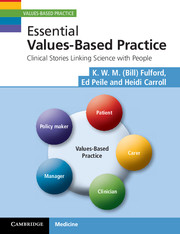Book contents
- Frontmatter
- Review quotes
- Contents
- Foreword
- Acknowledgements
- A bold claim to start this book
- Prologue: linking science with people
- Part 1 Values, individuals and an overview of values-based practice
- Part 2 The clinical skills for values-based practice
- 4 Recovery in schizophrenia: a values wake-up call
- 5 Teenage acne: widening our values horizons
- 6 A smoking enigma: getting (and not getting) the knowledge
- 7 Diabetic control and controllers: nothing without communication
- Part 3 Relationships in values-based practice
- Part 4 Science and values-based practice
- Part 5 Bringing it all together
- Postcript: the small change of care
- A bold claim to end this book
- Appendix A Values-based practice summary and definitions of key terms
- Appendix B Values-based practice teaching framework
- Index
7 - Diabetic control and controllers: nothing without communication
Published online by Cambridge University Press: 05 June 2012
- Frontmatter
- Review quotes
- Contents
- Foreword
- Acknowledgements
- A bold claim to start this book
- Prologue: linking science with people
- Part 1 Values, individuals and an overview of values-based practice
- Part 2 The clinical skills for values-based practice
- 4 Recovery in schizophrenia: a values wake-up call
- 5 Teenage acne: widening our values horizons
- 6 A smoking enigma: getting (and not getting) the knowledge
- 7 Diabetic control and controllers: nothing without communication
- Part 3 Relationships in values-based practice
- Part 4 Science and values-based practice
- Part 5 Bringing it all together
- Postcript: the small change of care
- A bold claim to end this book
- Appendix A Values-based practice summary and definitions of key terms
- Appendix B Values-based practice teaching framework
- Index
Summary
Topics covered in this chapter
The rich two-way interplay between traditional communication skills and values-based practice is illustrated by the way a GP, Dr. Mellon, manages a challenging problem of diabetes control presented by one of his teenage patients, Vicky Bartlett, and her mother.
Other topics include:
ICE and ICE StAR
Eliciting values
Clinical leadership and conflict resolution
Management theory and clinical leadership
Self-management and diabetes
Adolescent health and parental involvement
Team work.
Take-away message for practice
Values-based practice can enhance our communication skills in particular by adding strengths to the traditional focus on needs and difficulties.
At the most elementary level in communication skills training, students are taught to elicit ideas, concerns and expectations. Suggested originally by David Pendleton et al. (1984) and developed further by Roger Neighbour (1987) and others, the familiar acronym is ICE. We will use the acronym throughout this chapter but we do so respectfully, aware that all too often citing “ICE” has become some sort of substitute for really engaging with the ideas, concerns and expectations that are really about values. Indeed, linking ICE explicitly with values, as we will see in this chapter, is an important counterbalance to the tendency to “tick-box” reduction. This in turn is an aspect of the rich two-way relationship that, as we outlined in Chapter 2, exists between communication skills and values-based practice:
Communication skills support values-based practice particularly with (i) skills for eliciting values (of self and others) and (ii) skills of conflict resolution.
Values-based practice in turn supports communication skills by helping us to go behind the mantra and to really explore the values attached (by ourselves as well as our patients) to a condition, to the patient’s lifestyle and to their significant relationships.
Information
- Type
- Chapter
- Information
- Essential Values-Based PracticeClinical Stories Linking Science with People, pp. 81 - 96Publisher: Cambridge University PressPrint publication year: 2012
